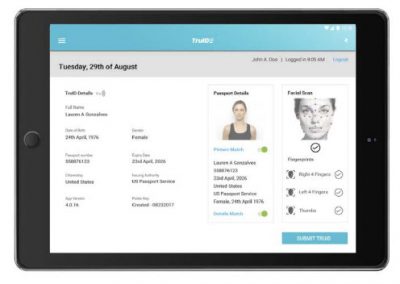

Travel Technology Trends: 2020 and beyond
Innovation in travel technology is changing the way we plan and experience our trips. As a business traveller, it’s important to stay up to date with the latest travel technology trends which may bring you heightened experiences in 2020 and beyond.
Below we outline some of the top technology trends of the year and what we can expect to see more of in 2020 and beyond.
1. RADIO FREQUENCY IDENTIFICATION (RFID)
Radio Frequency Identification, or RFID, is a form of wireless communication that can be used to track objects equipped with an RFID-embedded chip. IATA recommends the use of the RFID technology for baggage tracking which provides real-time baggage information that allows airlines to efficiently track the bag through all airport processes.
Luggage Tracking: British Airways let you track your luggage with RFID tags
British Airways’ digital reusable bag tag seamlessly connects your luggage to your BA app. The digital tag allows travellers to keep track of where their luggage is throughout the baggage handling process and helps reduce mishandling.
2. SMART DEVICES
A smart device is an electronic device, generally connected to other devices or networks via different wireless protocols that can operate to some extent interactively and autonomously. Travel industry players like hotels can make use of these devices to optimise the guest experience and streamline operations.
Hotel In-room Control: Alexa for Hospitality
Amazon has launched ‘Alexa for Hospitality’, designed to bring its voice assistant technology to hotel rooms. It simplifies tasks for guests like playing music, controlling in-room temperature or lighting, and even check-out.
3. KNOWN TRAVELLER DIGITAL IDENTITY (KTDI)
KTDI provides a frictionless travel experience for passengers while allowing them to have greater control over their personal data. The identity data that is usually stored on a chip on a passenger’s passport is instead securely stored and encrypted on their mobile device. Passengers can manage their identity data and consent to share it with border authorities, airlines and other pilot partners in advance. Using biometrics, the data is checked at every leg of the journey until arrival at the destination, without the need for a physical passport.
Passport-less travel: Fly passport-free between Canada and the Netherlands
The World Economic Forum and the governments of the Netherlands and Canada launched the first pilot project for paperless travel between the two countries at Montreal Airport.

Image Source: World Economic Forum
4. VIRTUAL AND AUGMENTED REALITY
The travel industry has started to adopt virtual and augmented reality technology to increase customer engagement.
Virtual reality provides travellers with virtual guided tours to enable travellers to digitally experience their surroundings before they get there, be it a hotel or a tourist hotspot.
Augmented reality is relatively handy and easy to access – from a smartphone device, travellers can find out more about the location, a building or a landmark they are in, in real-time.
VR Time Travel: Step into old Hong Kong
Hong Kong Tourism Board has launched “VR Time Travel: Step into Old Hong Kong” microfilms to offer tourists the opportunity to experience Hong Kong in years gone by.
AR map: Google’s ‘Live View’ AR walking directions for Google Maps
Google is launching its augmented reality walking directions feature for Google Maps. The Live View feature provides useful orientation by showing you arrows and big street markers overlaid on the real scene in front of you.
5. 5G NETWORK
The 5G speed of data transfer is bringing far-reaching benefits to your business trips. With 5G technology, the travel sector will become connected whether in transportation, culture or hospitality experiences. This new generation of the wireless network will bring many improvements and technological advancements, making the travel experience more seamless and flexible than ever.
Smart Hotel: OPPO unveils the world’s first 5G-powered hotel
OPPO Australia has created the world’s first travelling 5G network powered smart hotel. The 5G hotel is powered off OPPO’s Reno smartphone with 5G network and packed full of the latest technologies, including 5G cloud gaming, an AR wardrobe and advanced smart home features.
CTM SMART Travel Technology
CTM is committed to building customer-centric travel technology which is designed to enhance the travel experience for every stakeholder. Whether you are a travel manager, travel booker or a busy business traveller, we have developed a suite of tools and services specifically for your needs.
SHARE THIS PAGE:




